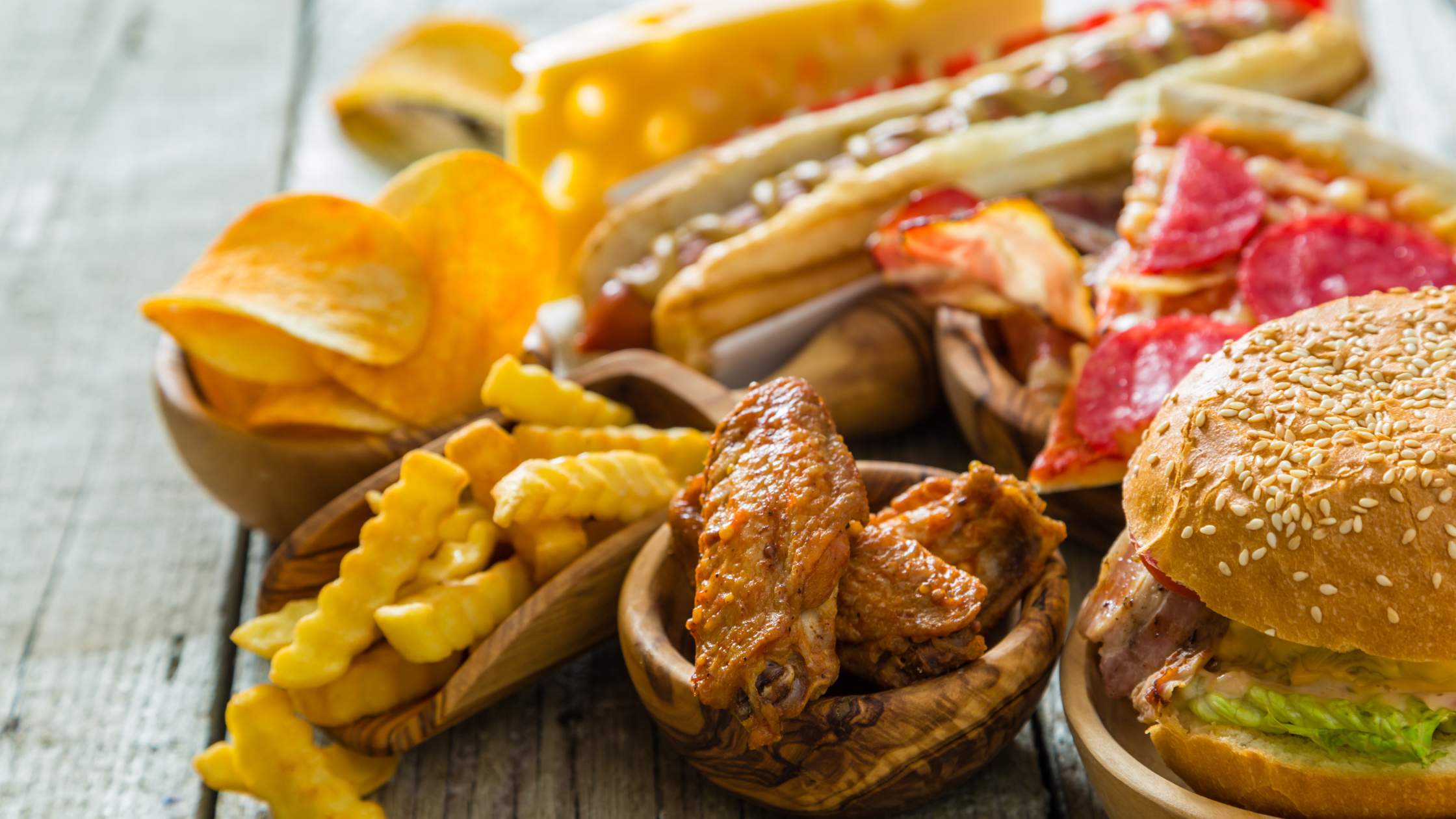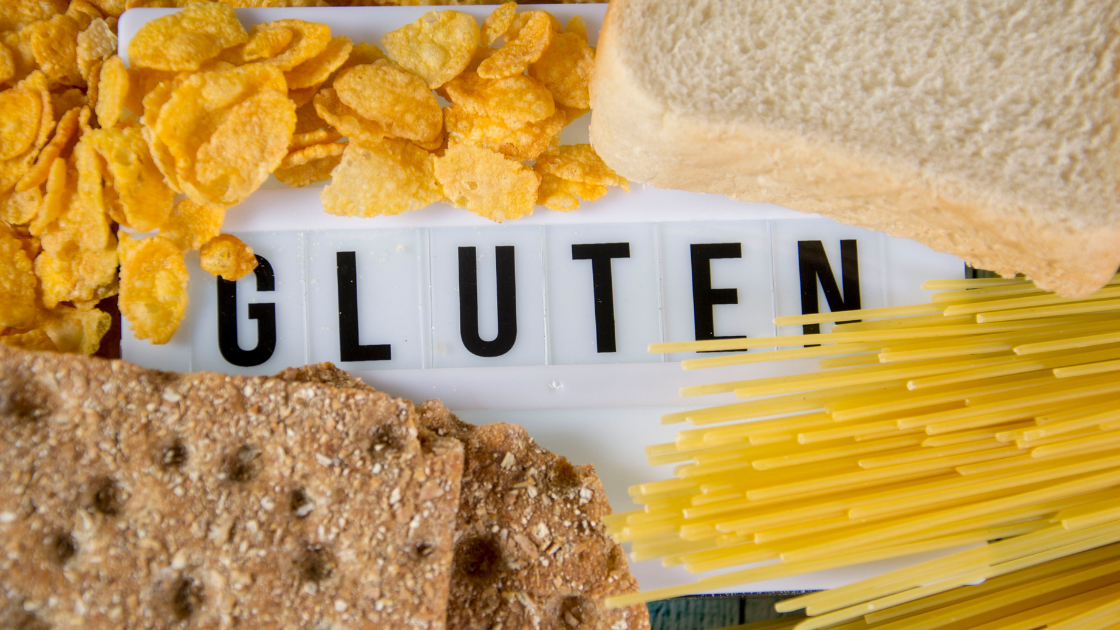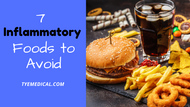7 Inflammatory Foods to Avoid for Better Health
Written by Tye Medical on Feb 9th 2021
Your diet directly impacts your body's inflammation levels. So, while it's wise to eat inflammation-fighting foods, you'll also want to know the top inflammation-causing foods to avoid. Eating these trigger foods could sabotage your efforts in the war against chronic illness.
Chronic inflammation plays a significant role in developing many serious diseases like type 2 diabetes, asthma, heart disease, cancer, Alzheimer's, and autoimmune disorders like rheumatoid arthritis.
Inflammation is your body's way of fighting off something harmful. It indicates a triggered immune system. When it's an appropriate response to a real threat, it's beneficial. But when the response lingers, because you continually expose your system to a trigger (like a food), the response becomes harmful or chronic.
For this article's purposes, we'll address foods or ingredients that trigger an immune response in most people, especially long term. For more information about the effects of inflammation and the anti-inflammatory diet pyramid, read our article, How to Reclaim Your Health with an Anti-Inflammatory Diet Plan.
Meanwhile, let's look at what not to eat and why.
1. Added Sugars

Our bodies are designed to process a limited amount of sugar (sucrose) daily. But our modern diet includes excessive amounts, which is why this sweet substance is one of the inflammatory foods to avoid. Since our systems weren't made to handle this excess, a high-sugar diet triggers the immune response. The body thinks it's an invasion – literally.
It also leads to insulin resistance and weight gain because the extra sugar is stored as fat, increasing your fat cells' size. It doesn't take much to overdo it.
Often, when you eat prepackaged, processed foods, you're getting some form of sugar. Over the course of a day, you might be surprised at how much you've "dosed" yourself with this processed sweetener. This is partly due to the prevalence of high-fructose corn syrup – a concentrated liquid form of sugar that is laced into countless food products.
Did you know foods like low-fat yogurt, spaghetti sauce, and dairy-free milk are high on the sugar chart, making them inflammatory foods to avoid? (Look for low or no-sugar variations of these products instead.)
Keep in mind that the small amount of fructose (a form of sugar) found naturally in fruits and vegetables isn't the problem. Consuming larger amounts of sugar from added sugars is what promotes inflammation and disease.
2. Artificial Trans Fats (Partially Hydrogenated Oil)

You've likely heard of trans fats and realize they're unhealthy. But did you know that there are two different kinds – natural and unnatural.
Natural trans fats exist in dairy and meant and don't cause inflammation or increase your disease risk. But artificial trans fats wreak havoc on your system. Initially, food manufacturers added hydrogen to unsaturated fats to create something with a longer shelf-life.
But now we know that artificial trans fats trigger inflammation and increase the risk of disease. Even today, you'll find them products like:
- French fries
- Fried fast food
- Some kinds of margarine
- Some shortenings
- Prepackaged baked goods (cookies and pastries)
- Products containing 'partially hydrogenated oil'
Keep trans fats high on your list of inflammatory foods to avoid.
3. Too Many Omega-6 Fatty Acids

When it comes to the omegas, balance is crucial. Omega-6s are good for you at healthy levels. But when they outweigh the amount of Omega-3 fatty acids in your system, it creates a pro-inflammatory response.
Most people have no trouble getting enough Omega-6s but need to increase their Omega-3s to keep inflammation at bay. That's why an anti-inflammatory diet plan includes healthy doses of Omega-3 rich foods and eliminates or reduces the use of oils high in Omega-6 (below).
Foods that are high in Omega-6 fatty acids and should be limited include:
- Corn oil
- Mayonnaise
- Peanut oil
- Sunflower oil
- Safflower oil
You'll still get healthy amounts of Omega-6s in foods like:
- Meat/poultry
- Fish
- Eggs
- Corn
- Soybeans
The average Western diet includes plenty of Omega-6 fatty acids without adding the excess contained in certain oils.
4. Refined Carbohydrates

Any food made with white flour or refined sugars is one of many inflammatory foods to avoid.
Processed carbs (refined carbohydrates) are stripped of their nutritional content, including fiber. But in addition to lacking in nutrition, your body quickly breaks them down into sugar that hits your bloodstream suddenly rather than gradually. This ignites your immune response and triggers inflammation.
Whole-grain or complex carbs take longer to break down because your body does the processing. Your digestive system must extract the nutrients and fiber, and since the process is slower, the sugars enter your system gradually.
In other words, when your body processes a reasonable amount of natural, unrefined carbs, it doesn’t result in inflammation (unless you're intolerant, which we'll discuss below).
5. Processed Meat

Processed meats have been salted, cured, smoked, or fermented, usually for flavor or preservation. During this process, preservative chemicals are often added. Over time, these chemicals damage the bowel and increase cancer risk.
Additionally, processed meats increase AGEs (advanced glycation end-products). AGEs form when sugar combines with protein or fat in the bloodstream (known as glycation).
When your body can't rid itself of AGEs quickly enough, they accumulate in your system and trigger inflammation. If you have diabetes or high blood sugar levels, you're already predisposed to producing too many AGEs.
Even more concerning, the inflammation from processed meat consumption is linked to the development of colon cancer.
6. Saturated Fat

You've undoubtedly heard that saturated fat is bad for your health. Aside from its effects on cardiovascular health, it also promotes chronic inflammation. Meals high in saturated fat trigger the immune system and your inflammatory response, while unsaturated fats seem to fight inflammation.
Animal products are primary offenders when it comes to saturated fat and include foods like:
- Beef
- Lamb
- Pork
- Poultry (with skin)
- Lard/cream
- Butter
- Cheese
- Other dairy products (not skim milk)
Remember that any baked goods or snack foods containing these foods are also higher in saturated fat and more likely to trigger inflammation when eaten regularly.
7. Gluten (If You're Sensitive)

While the foods mentioned above will likely trigger inflammation in most people over time, some ingredients only affect those with a specific sensitivity.
Gluten doesn't necessarily promote inflammation in everyone. But if your body has a tough time digesting it, it can trigger an immune reaction, even if you don't have an autoimmune disorder like celiac disease.
When you have a gluten sensitivity, your body assumes the offending substance is invading and sets your immune system on the attack against the gluten proteins. This promotes inflammation that's not isolated to your digestive tract – putting gluten high on the list of inflammatory foods to avoid if you're sensitive.
But if you have an autoimmune response (like with celiac disease), your immune system turns on your own body, directly attacking your intestinal tissue instead of the lurking gluten.
What Is Gluten?
It's a protein found in wheat, rye, barley, and triticale (a cross between wheat and rye). But the term 'wheat' includes a host of foods, including:
- Wheat flour (and anything made with it)
- Wheatberries
- Durum
- Semolina
- Farro
- Spelt
- Graham
- Emmer
- Farina
- Kamut
- Einkorn
Food manufacturers also use isolated gluten as an additive to help foods hold their shape or improve texture. Most store-bought breads contain naturally occurring gluten from wheat flour plus additional gluten to maintain the fluffy texture.
If you have gluten sensitivity or celiac disease, be sure to read packaged food labels carefully.
Reducing Chronic Inflammation Can Improve Bladder Symptoms
You can't cure all types of cystitis (inflammation of the bladder) through diet because often symptoms are due to bacteria or infection. But if you have a sensitive bladder, you might be able to decrease pain and improve continence by adopting an anti-inflammatory diet plan and marking inflammatory foods to avoid.
If you're battling leaks, we offer a range of products and absorbencies to keep you comfortable and dry.


